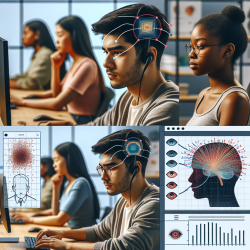As a Special Education Director, it's crucial to stay abreast of innovative strategies that can significantly impact our students' learning experiences. One such promising intervention is eye-tracking training, which has shown to improve the learning and memory of children with learning difficulties. A recent study titled "Eye-tracking training improves the learning and memory of children with learning difficulty" offers valuable insights into this technique's efficacy.
The study conducted by Chan et al. (2022) involved 53 primary school students with various learning difficulties, including autism spectrum disorder, ADHD, specific learning disorder, specific language impairment, and borderline intellectual functioning. The participants were randomly assigned to either an eye-tracking training group or a conventional after-school remediation class. Over eight months, the eye-tracking group demonstrated significant improvements in memory and faster learning compared to the control group.
Key Findings
- Children who received eye-tracking training showed a significant improvement in memory as measured by delayed recall.
- The eye-tracking group exhibited faster learning rates compared to the control group.
- Both groups showed improvements in reading abilities, although the eye-tracking group also demonstrated better memory and learning outcomes.
Implementing Eye-Tracking Training in Your School
Given these findings, implementing eye-tracking training in your school could be a game-changer for students with learning difficulties. Here are some steps to consider:
- Invest in Eye-Tracking Technology: Ensure your school has the necessary equipment to conduct eye-tracking training sessions.
- Train Your Staff: Provide professional development opportunities for teachers and therapists to become proficient in using eye-tracking technology.
- Integrate into IEPs: Consider incorporating eye-tracking training into Individualized Education Programs (IEPs) for students who may benefit from this intervention.
- Monitor and Evaluate: Regularly assess the progress of students undergoing eye-tracking training to ensure its effectiveness and make necessary adjustments.
Encouraging Further Research
While the study by Chan et al. provides compelling evidence for the benefits of eye-tracking training, further research is essential to explore its long-term effects and potential applications. Encourage your staff and colleagues to stay informed about the latest developments in this area through conferences, webinars, and professional publications.
To read the original research paper, please follow this link: Eye-tracking training improves the learning and memory of children with learning difficulty.










